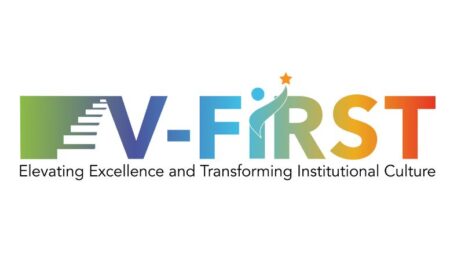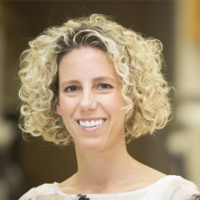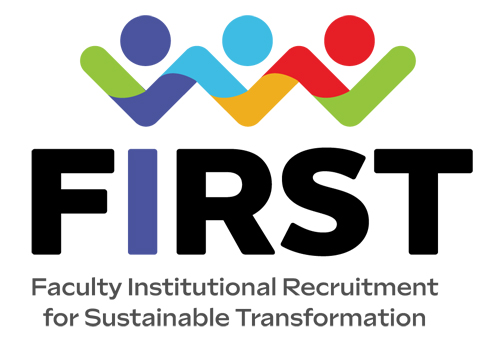
Vanderbilt University Medical Center and Vanderbilt University are launching a $17 million multiyear transformative program with support from the National Institutes of Health (NIH) to accelerate diversity, equity, inclusion and belonging in the biomedical research community.
The institutions will build on prior successes in recruitment to strengthen hiring, promotion and retention efforts for diverse, early-career investigators as a foundational element of the Vanderbilt Faculty Institutional Recruitment for Sustainable Transformation Program (V-FIRST). V-FIRST is funded by the NIH Common Fund Faculty Institutional Recruitment for Sustainable Transformation (FIRST) program as part of its third round of awards.

The V-FIRST principal investigators, led by Consuelo H. Wilkins, MD, MSCI, professor of Medicine, Senior Vice President and senior associate dean for Health Equity and Inclusive Excellence, and Alyssa Hasty, PhD, Cornelius Vanderbilt Professor, Molecular Physiology and Biophysics, associate dean for Faculty of the Basic Sciences, and Cybele Raver, PhD, Provost and Vice Chancellor for Academic Affairs, are strongly committed to and experienced in recruiting, mentoring and sponsoring faculty from underrepresented and minoritized groups.
The Vanderbilt community has a strong track record of enhancing the diversity of biomedical graduate students and postdoctoral fellows. In the last 20 years, Vanderbilt increased the percentage of women faculty to 50%, with women currently serving in key leadership roles, including University provost, Medical Center chief scientific and strategy officer, many department chairs, and three deans.

The NIH’s FIRST program is designed to cultivate and sustain cultures of inclusive excellence in the biomedical research community. “Inclusive excellence” refers to cultures that establish and sustain scientific environments that cultivate and benefit from a full range of talent and has the potential to be transformational for biomedical research at the awardee institutions and beyond.
“Vanderbilt is foundationally committed to inclusive excellence, and the V-FIRST program puts us on a fast-track to being an example of how to evolve into a diverse, self-sustaining research community. I am proud the leadership of both institutions are united on this goal that secures Vanderbilt’s future among the leading research institutions. Faculty from marginalized and historically excluded groups face many obstacles, and it is gratifying for the NIH to recognize and support solutions to overcoming these challenges,” said Wilkins, who is a national expert on health equity.

In the last two years, VUMC has brought on Black and Hispanic/Latinx faculty in biomedical and health sciences fields who are early-career, tenure-track investigators. However, there is an imperative to speed up recruitment efforts, Wilkins said. Nationally, the racial diversity among research faculty remains low: 4% Black, 4% Latinx, 0.2% American Indian, and 0.1% Pacific Islander.
“Securing this momentous multimillion dollar grant from the NIH allows us to create enhanced opportunities for individuals from underrepresented groups who have been historically absent from the STEM workforce. This collaborative effort between the university and VUMC empowers us to strengthen the scientific community, fuel innovation, and propel our nation forward,” said Raver.
V-FIRST is building upon recent strategies such as: toolkits for inclusive faculty searches, a discovery lecture series for national late-stage postdoctoral fellows from minoritized groups, and innovative institutional policy changes regarding diversity, equity and inclusion (DEI) are having a positive impact.
“This is an incredible opportunity to partner with the NIH to expand the diversity of our biomedical faculty. We are excited to be a part of this important initiative to nurture a culture of inclusive excellence among the faculty at Vanderbilt while helping ensure the success of a new generation of researchers. The principal investigators deserve tremendous credit for this effort and their longstanding dedication to inclusive approaches to transform the research enterprise,” said Jennifer Pietenpol, PhD, Chief Scientific and Strategy Officer for VUMC and holder of the Brock Family Directorship in Career Development.
Sarah Suiter, PhD, associate professor of the Practice, Department of Human and Organizational Development in Peabody College, is leading the evaluation core. More than four dozen faculty from VU and VUMC have agreed to be V-FIRST mentors to support and guide new faculty.
“This funding will allow us to recruit, mentor, promote and retain exceptionally talented new faculty members. The programming supported by this award will include activities that not only provide career development opportunities for our recruits, but intentionally weaves in opportunities for everyone in our research community to develop relationships that create a sense of belonging for all. This award demonstrates our ‘One Vanderbilt’ philosophy in its truest and best form,” said Hasty.
V-FIRST is funded by the NIH Common Fund through grant number U54CA280915.












